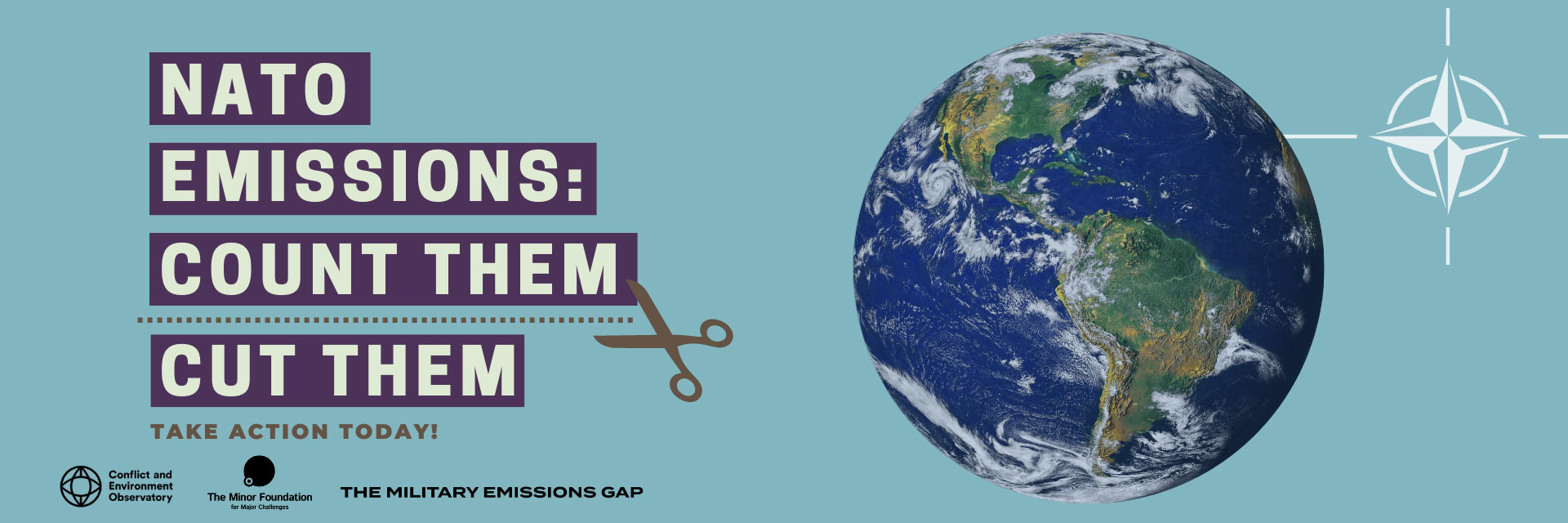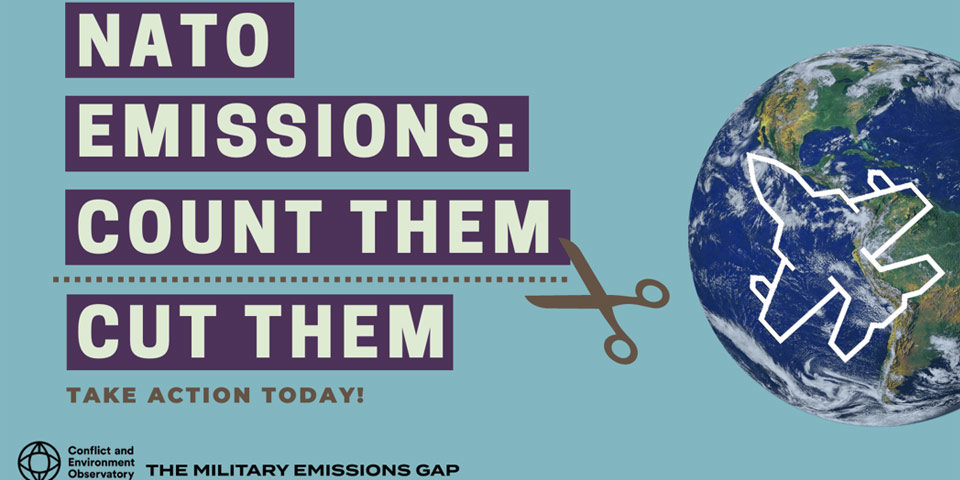NATO: commit to credible climate action
Join our call for action
NATO has pledged to cut its carbon emissions but is refusing to share how it will count them. Will your organisation join us in calling for NATO to make its methodology public, and for NATO member states to commit to military emissions reductions that are consistent with the Paris Agreement?

In June, NATO announced plans for the organisation to reduce its greenhouse gas (GHG) emissions and to work towards Net Zero by 2050.
NATO’s GHG emissions will be tracked and monitored using an unpublished methodology, developed by NATO. According to NATO Secretary General Jen Stoltenberg: “It sets out what to count and how to count it, and it will be made available to all Allies to help them reduce their own military emissions.”
But since this methodology is not publicly available we have no way of knowing what they will measure, or how they plan to achieve Net Zero.
According to the Intergovernmental Panel on Climate Change (IPCC), we need deep and immediate cuts in emissions across all sectors to limit warming to 1.5°C. We don’t have time for empty promises.
Join us in telling NATO: count them, cut them!
Count them:
-
- NATO: Make your GHG emissions tracking methodology public so that independent experts can assess its credibility.
- NATO members: Commit to counting emissions using the GHG Protocol and independent verification, and reporting them in a way that is robust, comparable and transparent.
Cut them:
NATO as an institution is not the main source of NATO’s emissions. The vast majority come from the militaries of NATO’s members and June 2022’s announcement did not cover their emissions.
-
- NATO members: Commit to verifiable military GHG emission reduction targets that are consistent with the 1.5oC target in the Paris Agreement.
If your organisation supports this call, please sign up using the form below. Together we can ensure that NATO and its members get the message before COP27 in November.
Supported by
So far 126 organisations have endorsed this joint call.
International
Global Network Against Weapons and Nuclear Power in Space
International Coalition to Ban Uranium Weapons
International Peace Bureau
International Physicians for the Prevention of Nuclear War
The United Methodist Church – General Board of Church and Society
Transnational Institute
Women’s International League for Peace and Freedom
Regional
EUROMIL (BE)
European Environmental Bureau (BE)
Quaker Council for European Affairs (BE)
National
80000 Voices (UK)
Abraham’s Children Foundation (NG)
Africa Foundation for Community Development (UG)
Agora Association (TR)
Agri Service Ethiopia (ET)
Aldrig Mere Krig (DK)
Amani (KE)
Amsterdamse Vredeswacht (NL)
Arbeitsstelle Frieden und Umwelt der Evangelischen Kirche der Pfalz (DE)
Assemblée européenne des citoyens (FR)
Associacao ACEMA (MZ)
Associação Lhonipane Massango (MZ)
Association Des Femmes Et Hommes Unis Pour La Paix Et Le Développement (CD)
Association for Farmers Rights Defense (GE)
Association For Promotion Sustainable Development (IN)
Association for Reconciliation and Development through English (BI)
Association for Rural Social Welfare (NP)
Association Malienne pour la conservation de la faune et de l’environnement (ML)
Association pour le respect du droit des populations autochtones, du développement durable et du droit de l’homme (CG)
Assistance Internationale pour le Développement (CD)
Barokupot Ganochetona Foundation (BD)
Bexhill and Hastings United Nations Association (UK)
Biba Transformations LBG (GH)
Biodiversity Conservation Center (RU)
Biodiversity Hub International (UG)
BOCS Civilization Planning Foundation (HU)
Bolangir Bikash Parishad (IN)
Campaña Colombiana contra minas (CO)
Canadian Friends Service Committee (Quakers)
Center for International Policy (US)
Center for Participatory Research and Development (BD)
Centre Delàs d’Estudis per la Pau (ES)
Centre for Communities Education and Youth Development (GH)
Centre For Peace and Development (PK)
Centre of Posterity Interest Organization (GH)
Centre For Social Development (PK)
Centro Studi Sereno Regis (IT)
Climate Emergency UK
CND Cymru – the Campaign for Nuclear Disarmament in Wales (UK)
CODEPINK (US)
Communication Workers Union NW Health & Safety Forum (UK)
Community Agenda Support (KE)
Community Restoration Initiative Project (UG)
Comunidade Mocambicana de Ajuda (MZ)
Conflict Transformation for Development (SD)
Deepti Bhuban (BD)
Demilitarise Education (UK)
Direct Focus Community Aid (PK)
Dukingire Isi Yacu (BI)
Endorois Indigenous Women Empowerment Network (KE)
Environmental and Rural Mediation Centre (NG)
Environmentalists Against War (US)
Ethiopia Disaster Risk Management Commission (ET)
Ethiopian Knoweledge and Technology Transfer Society (ET)
Evangelische Arbeitsgemeinschaft für Kriegsdienstverweigerung und Frieden (DE)
Foundation for Global Governance and Sustainability (BE)
Fridays for Future Indonesia (ID)
Fridays for Future Nigeria (NG)
Fridays for Future Sudan (SD)
Gautam Buddha Jagriti Society (IN)
Global Justice Now (UK)
Good Health Community Programmes (KE)
Green Christian (UK)
Green Liberty (LV)
Initiative For The Development of Africa (GH)
Jhanjira Samaj Kallyan Sangstha (BD)
Libyan Youth Climate Movement (LY)
London Campaign Against Arms Trade (UK)
Love Thy Neighbour (BD)
MADRE (US)
Maine Natural Guard (US)
Montreal Quaker Meeting (CA)
Movement for the Abolition of War (UK)
MY World México (MX)
Network for Education, Children and Youth (LK)
Norwegian People’s Aid (NO)
Peace Movement Aotearoa (NZ)
Peace Quest Cape Breton (CA)
Platform for Peace and Humanity (SK)
Polish Zero Waste Association (PL)
Project World Peace (UK)
(re)Generation Weston (UK)
Religions for Peace Canada (CA)
Religions pour la Paix – Québec (CA)
Rete Italiana Pace e Disarmo (IT)
Réseau National des Volontaires pour la Promotion du Développement Local en Haïti (HT)
Rochdale and Littleborough Peace Group (UK)
Safe Skies Clean Water Wisconsin (US)
Sankalpa Community Based Rehabilitation (NP)
Santé et Action Globale (TG)
Scientists for Global Responsibility (UK)
Solidarité Internationale Pour l’Afrique (ML)
Stand.earth (US)
StEP Sustainable Exercise Partnership (UK)
Stop Wapenhandel (NL)
Sukaar Welfare Organization (PK)
Sustainable Cooperation for Peace and Security (IT)
Svenska Freds – och Skiljedomsföreningen (SE)
The Jordanian Society of Friends of Heritage (JO)
The Lebanese Women Democratic Gathering (LB)
The Outreach Social Care Foundation (CA)
The Undivide Project (US)
Tipping Point North South (UK)
Tiruzer Ethiopia for Africa (ET)
Tower Hamlets Campaign for Nuclear Disarmament (UK)
Trident Ploughshares (UK)
UNISC International (JP)
Veterans For Peace Climate Crisis & Militarism Project (US)
Veterans For Peace Phil Berrigan Memorial Chapter (US)
Vredesbeweging Pais (NL)
Women’s International League for Peace and Freedom, Norway
XR Dacorum (UK)
Youth Development and Voice Initiative (GH)
Youth for Green Nature (CD)
Youth Foundation of Bangladesh (BD)
Zentrum Oekumene der EKHN und EKKW (DE)
Why does this matter?
Countries are still excused from comprehensively reporting their military emissions to the UNFCCC. As a result, the sector is lagging behind. Some militaries are starting to set Net Zero targets, like the US Army and the UK RAF, but without accessible data and with no means to track their progress, these targets risk being little more than military grade greenwashing.
This year, we released our Framework for Reporting Military Emissions. It outlines the emissions that we think militaries should be reporting. The framework considers the large and complex supply chains that militaries have, as well as the emissions caused by armed conflicts. Meaningful global action to reduce emissions demands that we can track and understand the contribution that militarism and conflicts are making to the climate crisis.
NATO and its members have an opportunity to demonstrate leadership on tackling climate change. The refusal to publish their methodology for counting emissions sets a dangerous international precedent.
What can I do?
Organisations
If your organisation is concerned about the current pace of action to address the climate crisis, please sign our call on NATO to make its methodology public using the form above.
Share this call on social media to encourage others to sign up using our downloadable social media pack.
Individuals
As an individual, you can also share this call on social media using our downloadable social media pack and write to your local politician to highlight this issue. You can use our guide here.
Resources
Download our Frequently Asked Questions on military emissions and NATO climate policy.





